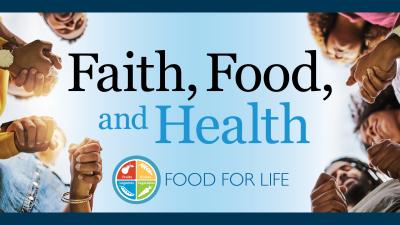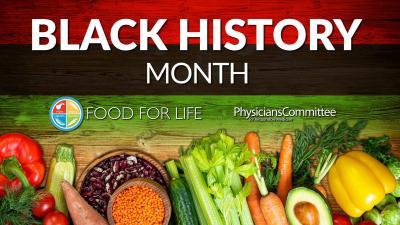African American Food for Life Instructors Transform the Health of Their Communities

Physicians Committee’s international network of licensed Food for Life instructors bring the power of a plant-based diet to communities around the world. Learn more about three Food for Life instructors who improved their own health with a plant-based diet and are now inspiring their communities to do the same!
The Food for Life nutrition and cooking class program is the Physicians Committee’s oldest nutrition education program. The community-based program delivers information about adopting a plant-based diet for optimal health directly to the people through in-person and online classes.
Robina Barlow
Olney, Md.
I lost my mother to a chronic disease when she was 42, and my family has a history of heart disease. Seven years ago, I started to notice my blood pressure, cholesterol, and weight beginning to rise. I started to investigate how the foods we eat affect our health and researched how diet can reverse disease. That led me to the Physicians Committee for Responsible Medicine and adopting a plant-based diet. After going plant-based, I had quick success in bringing down my blood pressure and cholesterol and have kept them in a healthy range. Because I was feeling better, I started to take up running again!
I wanted to share my knowledge with others to teach them how to live a healthy, full life, so I decided to get a certificate in plant-based nutrition through Rouxbe Cooking School. From there, I applied for and became a licensed Physicians Committee Food for Life instructor. I thought if I could show my family, friends, the African American community, and others who wanted to learn that food can improve our health, that I would be doing some good in the world.
I enjoy teaching others how to do for themselves, and how to make healthy food choices which make them feel better and feel they are in better control of their health. I have seen people change their approach to eating, exercising, relaxing, and sleeping.
Dennis Jones
Arlington, Va.
After leaving the Marines, I gained weight, had high blood pressure, and was prediabetic. After a year of eating vegetarian, I lost the weight but soon went back to my old lifestyle. Soon after, I almost had a heart attack, and doctors told me I would need a stent. I decided to go back to eating a plant-based diet and began to manage my symptoms. However, animal products slowly made their way back to my diet, and my health problems came back, too.
I was told I would need a double stent or bypass surgery, but both options did not have an optimistic outcome. Deciding to make the change for good, I took a 21-day plant-based challenge and found the Barnard Medical Center and the Physicians Committee. I have been plant-based ever since and became a Food for Life instructor to teach others how they can change their life with food.
One of the things I enjoy most about being a Food for Life instructor is receiving the emails or calls thanking me for helping them learn new skills and learning that plant-based eating tastes great, that their family loves the food, and that eating this way can be quick and easy.
Dr. Rhonda Coleman, DAOM
Aurora, Colo.
Over the years, I have attempted many levels of vegetarianism—pescatarian, ovo-pescatarian, ovo-vegetarian, and just plain vegetarian. I had difficulty maintaining any of those diets, or rather labels, because I had no real motivation to uphold such a lifestyle. I now follow a whole food, plant-based diet and I have seen the benefits firsthand.
In my first few weeks of studying Traditional Chinese Medicine, my education confirmed that I had an intolerance to dairy products, and I suspected the same intolerance was present in my then 10-month-old son. In the first week of changing my family’s diet, my son’s eczema completely cleared. As a physician, I am also very aware of how much more energy I have, how much clearer my skin is, and how much more regular I am when I do not consume meat or animal products.
When I counsel patients, I remind them that food should increase energy levels. Feeling tired after eating can be an indication that the food consumed requires the body’s energy reserves to process and that the food may be incompatible with their system. I also tell them that if they note any discomfort after eating, especially bloating and/or gas, to consider an evaluation of their diet.
A major strategy in disease prevention and health equity should be to offer more nutritional health education and invest in more fresh food in lower-income neighborhoods. Food is such an important tool to complete health.
Get Healthy With Good Nutrition
Food for Life classes teach you how to improve your health with a plant-based diet.











